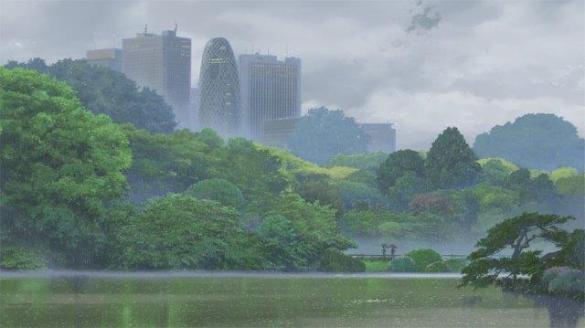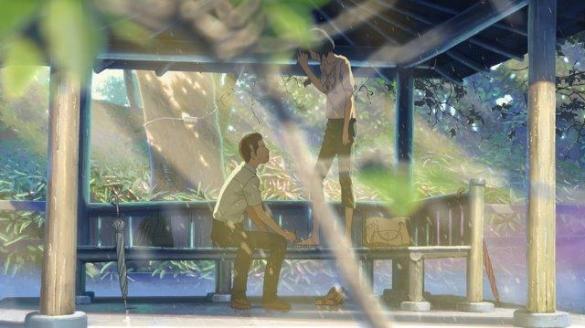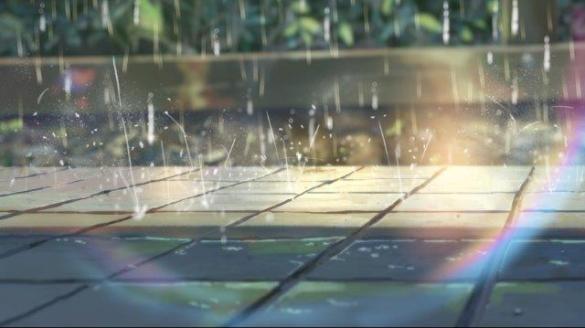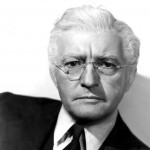Last year, when a friend suggested Makoto Shinkai’s The Place Promised in Our Early Days as a potential fit for my bizarre cinematic tastes, I was intrigued. And when I heard the director described as “The New Miyazaki,” I moved well past intrigued; I could hardly wait.
It was fascinating (both artistically and philosophically), and I resolved to hunt down as many of his films as possible — a tricky task, since he’s not particularly prolific, and they’re not particularly easy to find. Eventually, though, I’d managed to add 5 Centimeters Per Second: A Chain of Short Stories About Their Distance and Children Who Chase Lost Voices from Deep Below to my trophy case — Yes, Shinkai’s titles are a bit ornate, now that you mention it — and while neither captured my imagination as completely as The Place Promised, I feel qualified to render judgment on the “New Miyazaki” moniker:
The association isn’t a particularly helpful one, in my estimation. Nationality and medium are surface-level similarities, I suppose. And some of the ecological material suggests an ideological affinity, as well. But the two paint with disparate emotional pallets: Miyazaki’s films are whimsically playful and filled with childlike wonder — even the darker ones — while Shinkai’s films tend to be far more melancholic. There is an ache and an emptiness to them that is difficult to pinpoint, but which always leaves one feeling stripped bare. (This is not a criticism. A dose of wistful, melancholic emptiness can be an excellent thing from time to time. But it’s not particularly Miyazaki-like, in my estimation. Miyazaki touches on melancholy from time to time, certainly. But I don’t think I’ve ever felt it to be the “take-away message” — not even with Laputa: Castle in the Sky.)
Understandably, Shinkai downplays the comparison. “It’s an honor to hear,” he says, “but I think the comparison is an overestimation.” And who would want to labor under the crushing weight of those expectations, anyway? So, he has set about dispelling this myth the only way possible: by producing his own films ’till he and his distinctive interests become recognizable in their own right.
To that end, here’s the trailer for his latest — Garden of Words (Koto no ha no niwa). (I apologize for the confusing mixture of Japanese and English subtitles. They clutter things up a great deal, but I haven’t been able to find an English version yet. And I’m too impatient to wait any longer. Just turn ’em off, I say. They don’t add much, anyway. And neither does the apparently obligatory pop song.)
The film’s description places it firmly in his “wistful, regretful” wheelhouse: “According to Shinkai, the modern concept of ‘love’ (ai) was imported from the West. While his new Kotonoha no Niwa film is set in the modern era, it will be about koi in the original ‘lonely sadness’ meaning — of longing for someone in solitude, as opposed to the modern meaning.”
Watching the trailer reminds me of another thing worth mentioning (though probably less necessary if you’ve watched it for yourself): Shinkai is a visual master. The rain alone would be enough to establish that fact, but it’s hardly the only evidence. The flying sequence looks marvelous, as well. And don’t even get me started on the rack-focus.
HT: Jason Morehead’s Opus. Jason himself adds this helpful insight to the comparison: “Shinkai’s films tend to be intensely personal and introverted, and deal with primarily personal and inter-personal brokenness (e.g., unrequited love, broken hearts). “5 Centimeters Per Second” is a perfect example of this. Miyazaki’s films, however, tend to focus on larger, extra-personal conflicts and brokenness (e.g., war, environmental collapse). That’s not to say that Shinkai’s films don’t have larger events, but those events serve primarily as a way to highlight and build the inter-personal conflict and drama. At the same time, Miyazaki certainly has plenty of smaller, intimate moments that give his characters emotional depth, but I often feel like those are meant to drive home the importance of the larger external struggles.”



















